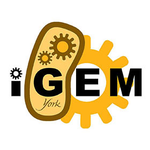About This Project
We envisage a world where our greatest source of power comes from the smallest organisms on Earth, where your mobile phone my one day be powered by synthetically engineered microorganisms, when non-renewable energy is a thing of the past.
Ask the Scientists
Join The DiscussionWhat is the context of this research?
We are creating batteries that don't ever need to be changed!
Our goal is to produce enough energy to power a wrist watch indefinitely, by perfecting current production by microbial fuel cells. These are a type of battery powered by live bacteria; as long as the bacteria are kept alive, the battery works. In the future such devices can be used to power our phones, watches or medical implants.
Our project involves engineering the microorganism Escherichia coli, to become 10 times more effective at producing energy while inside batteries. In addition, this organism will deposit gold nanoparticles on the battery, to increase its conductivity. The gold ions used in the process come from toxic pharmaceutical waste. Thus, a secondary goal of the project is to detoxify the waste, which is extremely harmful to the environment.
What is the significance of this project?
Our project comes at a time when all sources of power are fighting to be the better of several evils. We are proposing a cheaper, greener and more effective source of energy than existing ones. Currently, fuel cells do not produce sufficient energy to be used for household appliances. We hope that our engineered organism will help us change this and be the first step in revolutionising energy sources. Bacteria are the most abundant form of life on Earth and they grow easily, they survive in harsh environments and divide rapidly. Thus, they are a renewable, sustainable source of energy. We are a dedicated team of students, mentored by researchers accross several disciplines. We have the knowledge and the resources to develop and perfect this battery and are excite to be working at the edge of Synthetic Biology. A time could be approaching when our greatest power source comes from the tiniest organisms on Earth.
What are the goals of the project?
So far we have received initial funding from the alumni of the Biology Department at York, where we are based, and some corporate sponsorship in the form of discounts and lab products. Due to this we have been able to start lab work and really get the project underway. We hope to use funding from Microryza to further our research during the next 3 months, by purchasing lab reactants, synthesising genes and paying for sequencing analysis of our DNA constructs. The funding we receive is not just going into an undergraduate project, it is an investment into research that is helping move power sources into an exciting, cleaner age.
Budget
The money we hope to generate from Microryza will primarily go towards our lab work over the summer. Specifically we will purchase laboratory consumables, cover maintenance costs, synthesise 5kb of DNA and sequence 200 DNA samples.
Meet the Team
Team Bio
As the University of York celebrates its 50th year, we, a team of undergraduate Biology and Biochemistry students, have decided to celebrate in our own style, by becoming the first iGEM team in York’s history. iGEM, or International Genetically Engineered Machine, is a competition founded by MIT, in their own words ‘dedicated to education and competition, advancement of synthetic biology, and the development of open community and collaboration’. Each team receives a wide range of genes from several organisms and gets to combine them with new genes (or other DNA components), with the aim of designing, building and testing a synthetic biological system. In the spirit of our University's pledge for a greener future, our team of 14 undergraduates have dedicated ourselves to developing a more efficient microbial fuel cell over the course of the summer. We hope our research will help revolutionise the use of fuel cells and eventually the choice of power sources on a worldwide scale. If you have any questions about the project, please do not hesitate to get in touch with us via Facebook, Twitter, or email at igem.york.2013@gmail.comiGEM York
As the University of York celebrates its 50th year, we, a team of undergraduate Biology and Biochemistry students, have decided to celebrate in our own style, by becoming the first iGEM team in York’s history. iGEM, or International Genetically Engineered Machine, is a competition founded by MIT, in their own words ‘dedicated to education and competition, advancement of synthetic biology, and the development of open community and collaboration’. Each team receives a wide range of genes from several organisms and gets to combine them with new genes (or other DNA components), with the aim of designing, building and testing a synthetic biological system. In the spirit of our University's pledge for a greener future, our team of 14 undergraduates have dedicated ourselves to developing a more efficient microbial fuel cell over the course of the summer. We hope our research will help revolutionise the use of fuel cells and eventually the choice of power sources on a worldwide scale. If you have any questions about the project, please do not hesitate to get in touch with us via Facebook, Twitter, or email at igem.york.2013@gmail.com
Additional Information
Project Backers
- 9Backers
- 7%Funded
- $175Total Donations
- $19.44Average Donation
